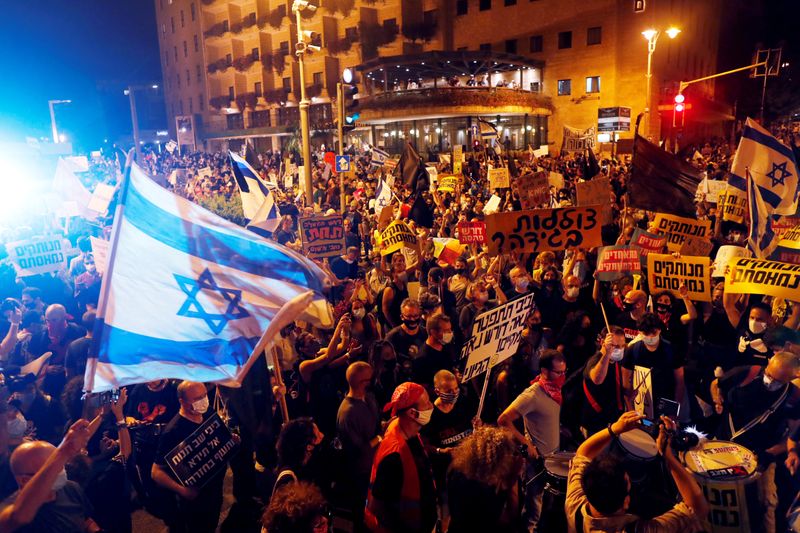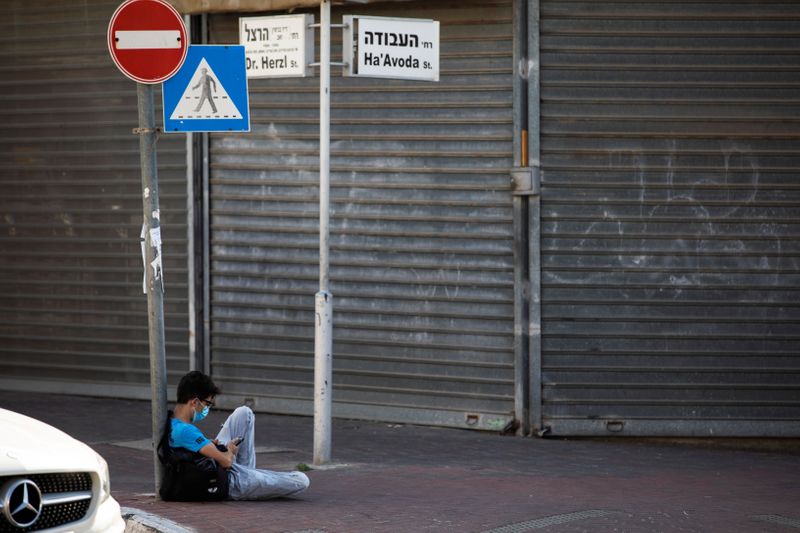By Maayan Lubell, Tova Cohen and Steven Scheer
JERUSALEM/TEL AVIV (Reuters) - Restaurateur Tamir Barelko has had enough.
Israel's decision last month to impose a second nationwide lockdown after a resurgence in coronavirus infections has dealt a hammer blow to the economy and the livelihoods of small business owners, Barelko says.
He launched a petition calling for small businesses to defy the lockdown and reopen from Sunday, the end of the Jewish holiday season, and has attracted more than 60,000 supporters for his campaign on Facebook (O:FB) over the past two weeks.
The finance ministry and central bank support reopening offices of companies that can avoid face-to-face contact with customers, or employ less than 10 workers - highlighting growing tensions over Prime Minister Benjamin Netanyahu's handling of the pandemic, which is set to see Israel's economy shrink this year for the first time in nearly two decades.
"The economy is breaking down, people's hope is breaking down," said Barelko, speaking in the Tel Aviv restaurant he runs, now empty of customers. "If the government does not give us the opportunity to live and to provide for our families, we'll do it ourselves."
Thousands of people have taken to the streets across Israel for almost daily protests that have built up since July, demanding Netanyahu resign over his handling of the crisis and over corruption charges he faces in court, which he denies.
The country, with a population of nine million, has reported nearly 280,000 COVID-19 cases and more than 1,800 deaths.
Schools and most offices, shops and restaurants are closed, unless they provide "vital services" such as supermarkets, pharmacies and banks, and people must stay within a kilometre from their home - harsher restrictions than in many other countries fighting a second wave.
Netanyahu had wide public backing when he imposed the first lockdown, lasting from mid-March until late May, which flattened the first wave of COVID-19.
But as infections soared after schools and businesses reopened, the cabinet bowed to pressure from some coalition partners and watered down limited lockdowns on infection epicentres to the extent that the curbs became ineffective.
On Sept. 18 the entire country was put under full lockdown again, extended on Wednesday until Oct. 13, a measure now widely seen as an avoidable failure for which Israelis will pay dearly.
An Israeli official, speaking to Reuters on condition of anonymity, said political pressures were "only part of the picture." Partial restrictions would not have been sustainable in such a small, close-knit country. "A partial lockdown is very difficult to do in Israel," the official said.
Opinion polls, however, show only about a quarter of Israelis have confidence in government policies to contain the spread of the virus.
"The second lockdown signals to investors and consumers that this is a whole different story, the health crisis is much worse," said Momi Dahan, an economist at the Hebrew University of Jerusalem. "(It) also signals that the management of the crisis is poor and amateur."
Bank of Israel Governor Amir Yaron told Army Radio on Thursday that the government's decision making "could certainly have been more orderly."
Israel's economy tipped into recession in the second quarter and is set to shrink by 6% this year, the OECD forecast in a report published on Sept. 23, its worst performance ever, as lockdowns depress business activity and consumer confidence.
Without a budget in place amid political bickering, Israel has fewer resources to deal with the crisis. So far it has allocated 100 billion shekels ($29 billion) on measures including aid to businesses whose revenue has fallen by at least 25% due to the pandemic.
SLOW RECOVERY
Economists initially predicted the economy would rebound quickly from the pandemic, but the OECD now cautions "the recovery will be slow," forecasting gross domestic product will grow by only 2.1% in 2021.
Daily infections of COVID-19 have dropped from around 8,000 to below 5,000 since the second lockdown began, but Netanyahu has said restrictions could persist for many more months.
"There is cautious optimism that the lockdown is working but it is too early to say," Netanyahu said on Twitter on Thursday. "I will continue to make the right decisions and do what is right for you, the citizens of Israel. I will not bow to political pressure from either side, from inside the government or outside it."
But pressure is growing.
"It is important we resume activity of the small businesses," Yaron told Army Radio. "Businesses that don't receive customers, where data has not shown high infection risk, comprise almost 10% of the workforce and product - almost 400,000 workers."
Asked if he thought they should open, Yaron replied: "Yes."
The finance ministry said on Tuesday that small businesses and businesses that don't serve customers should reopen from next week, after the Sukkot holiday.
Israel's unemployment rate has tripled since the first quarter of this year to above 11%, a 15-year high, and the finance ministry's chief economist, Shira Greenberg, estimates a 5-1/2-week-lockdown would cost the economy 25 billion shekels, or 1% of economic output.
Business analytics firm Dun & Bradstreet has estimated 80,000-85,000 firms in Israel will go out of business this year, a 7-8% decline in the number of businesses.
It is not clear how many small businesses will defy the lockdown and reopen on Sunday, but Jonathan Katz, chief economist at Leader Capital Markets, said that if businesses can get back to normal by the end of the year Israel's economy could grow by 5% in 2021.
"If we avoid a third shutdown and most of the damage is in Q4 of 2020 we would be starting 2021 with a clean slate," he said.
The Israeli official said small businesses would likely be the first to open when lockdown is relaxed, "but we are not there yet."
Katz said the Bank of Israel may cut its benchmark interest rate to zero for the first time at its monetary policy meeting on Oct. 22, from 0.1%.
Other measures the bank could take to support the economy include doubling its government bond purchase programme to 100 billion shekels and extending long-term loans to banks at negative interest rates, on condition the loans translate to credit for the private sector, he said.

($1 = 3.3916 shekels)
